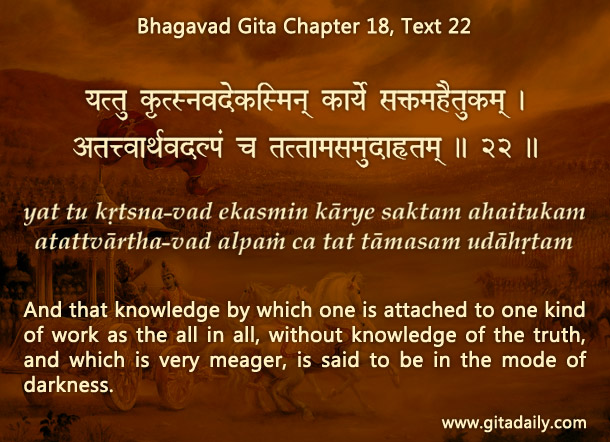The Netflix series Adolescence: a Bhagavad Gita perspective
The Netflix series Adolescence has gained attention for its depiction of the impact of the online world—especially toxic chat groups—on adolescents. It particularly explores how such online environments can become dangerously destructive. I’d like to offer three points using the acronym TIC: Theme, Implication, and Correction.
Theme: The danger of online radicalization
The theme of online radicalization is an urgent societal issue. The particular form of radicalization depicted—whether religious, racist, or gender-centric—is often a politically charged choice and may be subject to criticism.
The Bhagavad-gita (18.22) refers to this form of distorted perception as knowledge in the mode of ignorance. It occurs when we take a fragment of information and blow it out of proportion, viewing one part as the whole, and thereby fostering extremism. In this series, the radicalization portrayed focuses on young males developing hostility based on gender and race—turning against women and marginalized racial groups.
While the storyline includes a teenage boy killing a girl, my focus here is not on that specific incident but on the broader issue: how online propaganda impacts the youth.
Implication: The psychological impact of the online world
This theme raises serious implications. Today’s youth are exposed to an alternate world that even their parents may not fully comprehend. How much—and for how long—can parents monitor their children’s online activity? These are difficult but pressing questions.
Why is the virtual world often more influential than the physical one? I believe there are three key reasons:
- The real world feels predictable and disappointing.
The Gita (8.15) describes the material world as duhkhalayam—a place of misery. This doesn’t mean everyone suffers crushing pain constantly, but many feel a deep existential dissatisfaction. When family life, school, and society fail to fulfill or inspire, the online world—with its constant novelty and stimulation—offers an alluring escape.
A recent cartoon captured this irony: a man says, “My broadband was down yesterday, so I spent time with my family. They seem like nice people.” Comic and tragic—disconnection is now normal.
- The online world contains all three gunas—sattva, rajas, and tamas.
Like the physical world, the virtual world has light and darkness. It offers:
Sattva: Knowledge, education, spiritual content.
Rajas: Ambition, materialism, sensuality.
Tamas: Hatred, bigotry, violent content, ideological brainwashing.
If someone stumbles into sattva, they may grow. But if they descend into tamas, the consequences can be devastating. The virtual world reflects the mind’s capacity for both good and evil, and its dangers are intensified by its invisibility and accessibility.
- The shift from light to dark happens subtly and swiftly.
One moment, a person may be watching an uplifting spiritual video. A click later, they’re immersed in hateful rhetoric and targeted misinformation. This subtle descent into darkness is what makes today’s illusory energy even more formidable.
The Gita’s 16th chapter describes how consciousness can be dragged in hundreds of directions. The “internet”—literally a net—can become an “intentionally entrapping net.” In seeking quick pleasure, one may fall into psychological and moral degradation.
Correction: What can we do?
To counteract this danger, I suggest a three-fold response using the acronym ACT: Alertness, Constraints, Transcendence.
- Alertness
Parents and caregivers must be alert—not just about others, but also about their own exposure to online influences. A child may be physically safe at home but mentally devastated. Giving a device to a child as a substitute for presence and engagement is not a viable long-term solution.
Yes, life is demanding. But parenting includes being alert to these subtle threats. As Krishna says in the Gita (3.20), everyone must do their duty to maintain social order. Our family life, too, can disintegrate if we neglect this responsibility.
- Constraints
While we can’t monitor everything, some boundaries must be set—technological, philosophical, and relational. Just as we wouldn’t leave our home door open to kidnappers, we shouldn’t leave our digital doors open either.
Parental controls help, but more crucial is educating children about the risks lurking in the virtual world. The Gita (3.40–41) emphasizes regulation of the senses. Such regulation may come from self-discipline, culture, or community-imposed boundaries.
Even tech CEOs limit their own children’s screen time. Shouldn’t we be equally cautious?
- Transcendence
The physical world will always seem less exciting than the virtual world. So we need to offer something deeper. We must connect children with their inner compass—the divine presence in their hearts.
A spiritually nourishing environment, filled with vibrant devotional activities, can help children taste a higher joy. This makes virtual escapism less attractive.
Moreover, transcendence means avoiding a victim mentality. No one is destined to be a victim. Each of us is a precious part of God, and He wants us to be victorious. Krishna spoke the Gita to inspire Arjuna to rise and win—not by hating others, but by standing for righteousness.
Transcendence doesn’t just mean escaping this world. It also means engaging with this world from a higher spiritual consciousness—seeing our talents and interests as divine gifts meant to bring positive change.
When we give children a vision of life that is rich with purpose, faith, and optimism, the virtual world’s temptations will seem pale and stale in comparison.
Conclusion
To summarize, I used the acronym TIC:
Theme: Radicalization through the virtual world is real and dangerous.
Implication: The virtual world appears more exciting than the physical one and contains both upliftment and degradation. Transitioning from light to darkness can be subtle and swift.
Correction: The solution is ACT—Alertness, Constraints, and Transcendence.
Let’s help ourselves and our children become victors—not victims—by serving the supreme victor and living with spiritual purpose.
***
18.22 And that knowledge by which one is attached to one kind of work as the all in all, without knowledge of the truth, and which is very meager, is said to be in the mode of darkness.



Leave A Comment